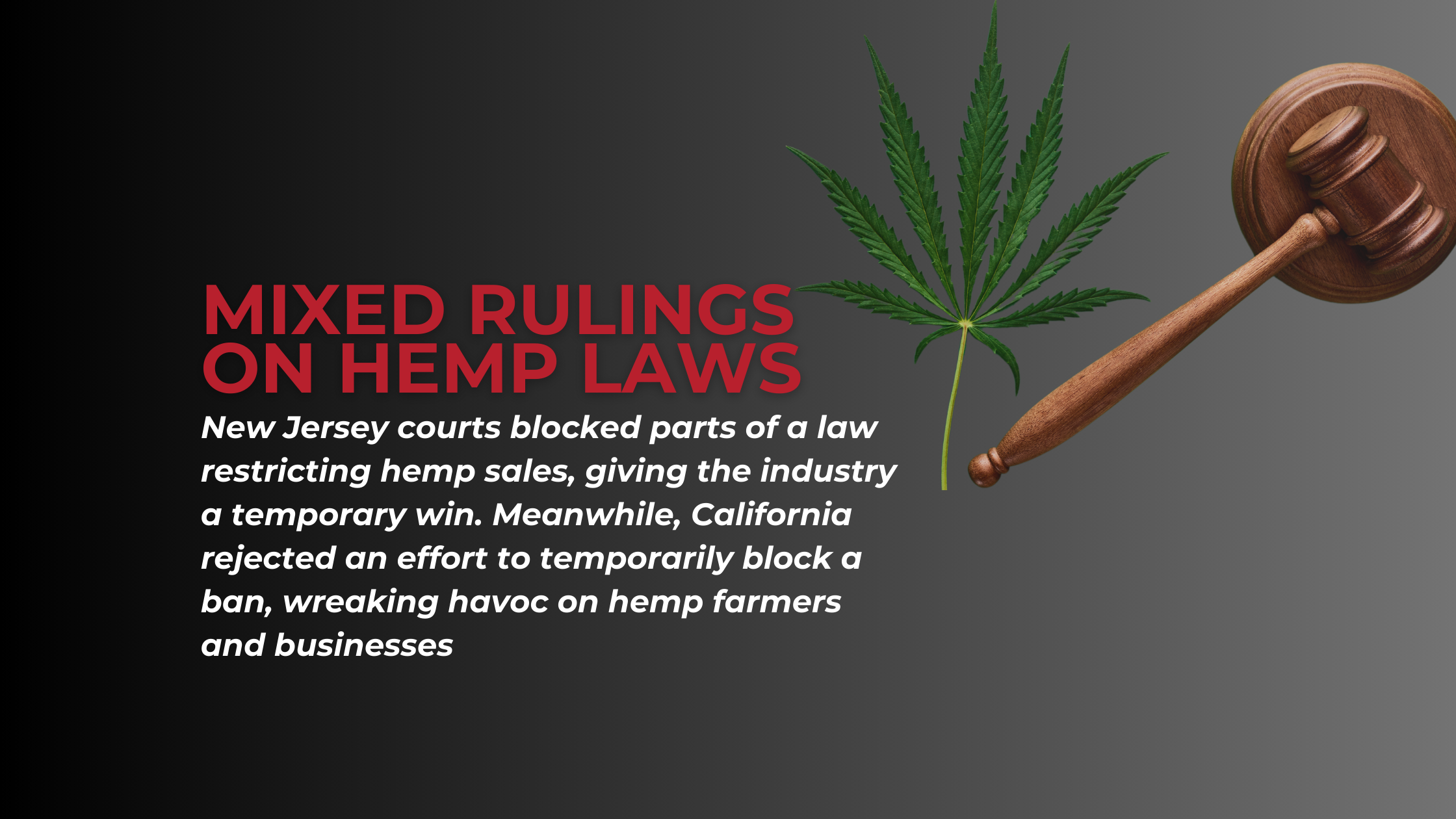
Hemp Industry Crossroads Two Court Rulings That Could Shape Its Future
The hemp industry, once overshadowed by its psychoactive cousin, cannabis, has surged to the forefront of agricultural innovation and economic promise. This versatile plant, capable of producing everything from textiles to biofuels, is transforming industries and economies alike. Yet, as its popularity grows, so does the complexity of its legal landscape, especially in the United States.
Recently, two significant court cases have highlighted the evolving dynamics between federal and state laws governing hemp. These cases, set in New Jersey and California, have attracted attention from hemp industry professionals, legal experts, and consumers alike. The decisions could have far-reaching implications for the future of hemp cultivation, sale, and consumption.
In this blog post, we will explore these court cases, their potential impact on the industry, and the broader implications for hemp growers, businesses, and consumers. Our goal is to provide a comprehensive understanding of the current challenges and opportunities within the hemp industry, and how stakeholders can advocate for clearer and more supportive regulations.
Overview of the Federal and State Laws Affecting Hemp
Navigating the legal landscape of hemp requires an understanding of both federal and state regulations. The federal government made a landmark decision in 2018 by legalizing hemp with the Farm Bill. This pivotal legislation removed hemp from the list of controlled substances, distinguishing it from marijuana and allowing for its cultivation and sale nationwide, provided that it contains less than 0.3% THC (tetrahydrocannabinol).
However, the federal approval of hemp did not nullify individual state laws. Each state retains the authority to regulate hemp according to its own legal framework, creating a patchwork of regulations across the country. For instance, while some states have embraced hemp cultivation and commerce with open arms, others maintain strict controls or outright bans on certain hemp-derived products.
This dual layer of regulation has led to confusion and conflict as states attempt to align their policies with federal law while addressing local concerns. The recent court cases in New Jersey and California highlight these ongoing legal challenges and the need for a cohesive strategy to address them.
Detailed Analysis of the New Jersey and California Court Cases
The legal battles in New Jersey and California offer contrasting narratives about hemp regulation in the United States.
New Jersey's Case
In New Jersey, the court's preliminary ruling was a win for hemp advocates. The case centered around state-imposed restrictions on hemp-derived products, which some argued were overly stringent and inconsistent with federal law. The court sided with the plaintiffs, concluding that the state's restrictions unjustly impeded the growth of a federally legal industry. This decision was celebrated as a positive sign for local hemp farmers and businesses eager to expand their operations.
California's Case
Conversely, the California case presented a more challenging scenario for the hemp industry. The court upheld the state's stringent regulations, which included bans on certain hemp products. This ruling was seen as a setback by those advocating for broader access to hemp-derived goods. The decision underscored the complexities and obstacles faced by the industry in a state already known for its progressive stance on cannabis.
These disparate outcomes illustrate the ongoing uncertainty in hemp regulations, with each state interpreting and enforcing laws differently. The legal community and industry stakeholders are watching closely as these cases progress through the courts, recognizing their potential to influence legislative changes across the country.
Implications of the Court Decisions on Hemp Farmers, Businesses, and Consumers
The recent court decisions have profound implications for the hemp industry. For farmers and businesses in New Jersey, the favorable ruling provides a pathway to expand their operations and invest in new opportunities. It signals a supportive environment where businesses can thrive under clear and reasonable regulations.
In contrast, the California ruling represents a hurdle for hemp entrepreneurs. The upheld restrictions limit market access and stifle innovation within the state. This outcome serves as a cautionary tale for other states considering similar regulatory approaches, highlighting the potential economic consequences of restrictive policies.
Consumers are also affected by these legal developments. In states with favorable rulings, consumers can expect greater availability and diversity of hemp products. However, in states with stringent regulations, access to these products may remain limited, impacting consumer choice and potentially driving demand to other states with more lenient laws.
Perspectives from Legal Experts and Industry Professionals
Legal experts and industry professionals have weighed in on the implications of these court cases, emphasizing the need for a streamlined approach to hemp regulation.
One legal expert noted, "The conflicting court decisions highlight the complex interplay between federal and state law in the hemp industry, signaling a need for federal clarity." This sentiment underscores the importance of a unified legal framework that can effectively bridge the gap between federal aspirations and state realities.
An industry professional added, "The New Jersey ruling provides a glimmer of hope for hemp businesses, but the battle is far from over. Each decision shapes the future of the industry." Their perspective highlights the ongoing nature of legal battles and the incremental progress necessary to secure a supportive regulatory environment.
Consumer and Advocate Reactions
Reactions from consumers and hemp advocates have been passionate and varied. In New Jersey, the ruling has been celebrated as a victory for consumer access and choice. Local advocates are optimistic that this decision will encourage other states to adopt similar pro-hemp policies.
In California, however, the response has been one of frustration and determination. Many advocates express disappointment with the court's decision, viewing it as a setback for the broader movement toward hemp legalization and consumer empowerment. They are mobilizing efforts to challenge the ruling and push for legislative reforms that align with consumer interests.
One advocate remarked, "Consumers and advocates must stay engaged in the fight for hemp legalization and regulatory clarity to ensure a sustainable future for the industry." This call to action resonates within the community, highlighting the importance of continued advocacy and involvement in shaping the industry's trajectory.
The Future of Hemp Regulations and the Industry
The future of hemp regulations in the United States remains uncertain, as both federal and state governments continue to grapple with the complexities of this burgeoning industry. However, there are signs of progress and potential pathways to a more unified regulatory landscape.
The diverging court decisions underscore the need for comprehensive federal legislation that provides clarity and consistency across state lines. A legal scholar noted, "The diverging decisions illuminate the need for a comprehensive federal framework that respects state sovereignty while providing certainty for hemp stakeholders."
Industry stakeholders are advocating for policies that support innovation, sustainability, and economic growth. By engaging with policymakers and supporting organizations dedicated to hemp advocacy, stakeholders can help shape a regulatory environment that balances consumer safety with industry potential.
Conclusion and Call to Action for Advocacy and Industry Support
In conclusion, the recent court cases in New Jersey and California highlight the ongoing challenges and opportunities within the hemp industry. These decisions provide both cautionary tales and hopeful prospects for hemp stakeholders across the United States.
For hemp industry professionals, legal experts, consumers, and advocates, the path forward involves active engagement and advocacy. By participating in discussions, supporting legislative initiatives, and staying informed about regulatory developments, stakeholders can contribute to a more supportive and thriving hemp industry.
We encourage readers to connect with organizations and communities dedicated to hemp advocacy, fostering a collaborative effort to shape the industry's future. Together, we can work toward a regulatory framework that empowers businesses, protects consumers, and realizes the full potential of hemp as a sustainable and versatile resource.



